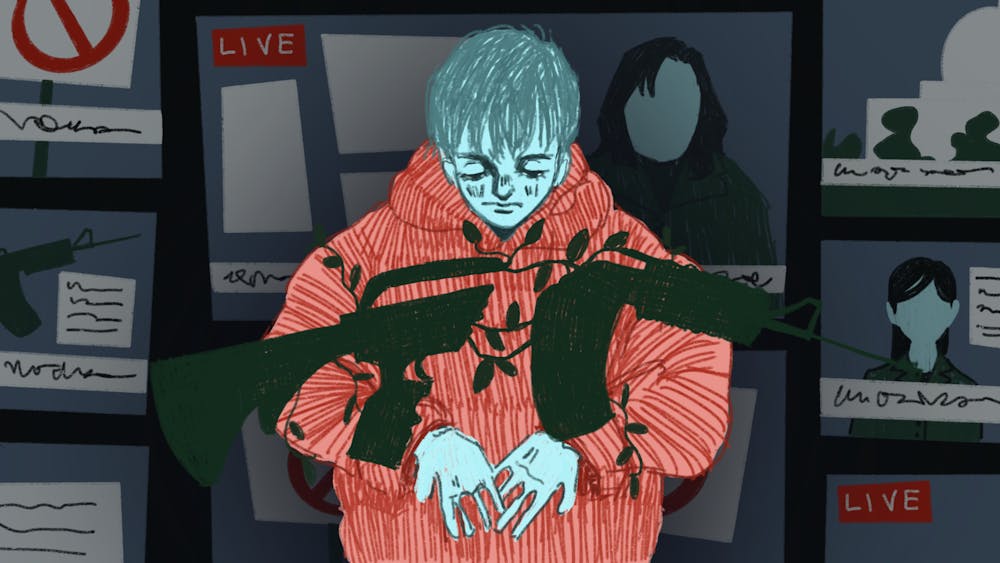
In the wake of mass shootings across the nation, mental health of not just the survivors and families but also the general public can suffer. To address the negative mental health effects of gun violence, we need to take action through gun control legislation.
The world can feel unsafe for those who are overexposed to news and the media after mass shootings. Sara Johnson, professor of pediatrics at Johns Hopkins University of Medicine, said in an interview with the New York Times that these kinds of events can make people feel “that they are powerless to change the circumstances in which they’re living.”
Although gun violence is not a new phenomenon, it should never be normalized. Implementing gun control legislation could significantly curtail its growing prevalence. While the only people who can effect legislative action are our representatives, it doesn’t leave us completely powerless to address this issue. You can still call your representatives to voice your opinions and vote in elections.
If you are worried about mass shootings, you certainly aren’t alone. In a study conducted by the American Psychological Association in 2018, 75% of Generation Z “report mass shootings as a significant source of stress.” The same study found that Gen Z is more likely to report poor mental health compared to older generations. Additionally, proximity to shootings has shown to have an even greater impact on mental health, according to a study of children and teens living in West and Southwest Philadelphia published in 2021. This study found that among children living within two to three blocks of a shooting, there were increased mental health related visits to the emergency department for up to two months after the shooting took place. Addressing gun violence is crucial to alleviating the stress that everyone is facing.
Gun violence issues are especially close to home for the Penn community, with a recent shooting on South Street, which is just a few miles from campus. In response to this incident, the Division of Public Safety at Penn sent out an email to members of the Penn Community acknowledging the increase of violent crimes, stating “we recognize the impact it may have on those living, working and studying in our community.” In the email, they also provided links to resources, including the phone number for CAPS and the website for Wellness at Penn. However, hearing news like this can make students feel unsafe even just walking around campus, and, while there are resources available like the walking escort, no students should fear for their safety around campus in the first place. Worrying about whether it’s safe to go out at night will certainly have negative consequences on students’ mental health.
There are a few steps that we can take for our mental health when gun violence occurs. Personally, I avoid watching the news for a few days to wait until I am mentally prepared to learn more. Staying informed is important, but so is taking care of your mental health. If you believe consuming media and learning more about tragedies may be problematic for your mental health, it would be completely reasonable to take a break from the news for a few days. Talking to friends about challenges you’re facing can also help, which is a good strategy for any mental health concern. Additionally, students can reach out to CAPS for additional support.
It is normal to feel a range of emotions in the face of any tragedy. Personally, after hearing about the Uvalde, Texas shooting, I was deeply upset. I help co-lead a couple of Girl Scout troops where a lot of my scouts are the same age as the victims. It’s difficult to imagine a world where any one of them could lose their lives to a school shooter, but this is the reality we’re living in. I was also angry; towards the person who committed the act of violence, for all the circumstances that went wrong, and towards legislators who senselessly refuse to pass gun control laws to prevent future violence.
Taking action is another method for dealing with grief and anger in the wake of gun violence that many find useful. It should be without question that we take steps to prevent future gun violence for numerous reasons, including saving lives and improving the mental health of many. After years of gun violence, we need to finally do something. California’s example has shown us that gun control does work when measures are put in place, like not allowing those who have been convicted of a crime to get a gun for 10 years, imposing standards on gun manufacturers, and mandatory background checks. That seems like a simple enough solution, and the impacts that it would have on decreasing violence and helping mental health are well worth it.
The fact is, children should not need to worry about gun violence at school in addition to the many other things that they are already stressed about in today’s world. As long as people, especially youth, are exposed to gun violence, mental health issues will continue to grow, and that, in addition to saving lives, is another crucial reason to start taking action towards gun control.
If you or anyone you know is struggling with mental illness, please call the Suicide Prevention Hotline at 800-273-8255.
KATIE FRANCIS is a rising College junior studying communications from Oklahoma City. Her email is kafran@sas.upenn.edu.
The Daily Pennsylvanian is an independent, student-run newspaper. Please consider making a donation to support the coverage that shapes the University. Your generosity ensures a future of strong journalism at Penn.
Donate







